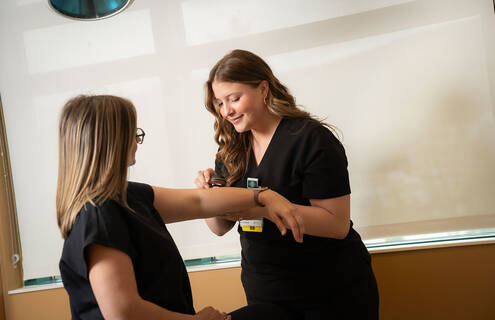
The words are shocking.
You have cancer.
About 2 million people in the United States hear those words every year.
Peter Lennon heard the news when he was diagnosed with stage 2 colon cancer after a routine screening.
"My doctors told me I would have had less than five years to live if the cancer went undetected."
Peter Lennon, fire marshal for the Manchester Fire Department
For Lennon, screening led to diagnosis and successful treatment. For those who are not so fortunate, is there a downside to knowing you have cancer?
The fear of getting a screening
Getting screened for cancer can help increase survival. But the thought of getting a mammogram, colonoscopy or pap smear can often spark high levels of fear and anxiety.
"Some patients will say to their primary care physicians, 'I don't want to know, doc,'" says Sally Kraft, MD, MPH, Population Health Officer at Dartmouth Health.
Getting diagnosed with cancer is a life-changing event that comes with enormous emotional stress and personal turmoil. So it's no surprise that some may wonder if there is an upside to not finding out.
When early detection can benefit
But in most instances, you are better off knowing.
"I think there are more positives than negatives to knowing you have cancer," Kraft says. "With that knowledge, what can you do differently?"
Screening can detect cancer at early stages before symptoms occur, with better chances of successful treatment. Four types of cancer—breast, cervical, colorectal and lung—have regular screening tests recommended by the medical community.
Diagnostic testing is different from screening as it occurs when symptoms are already present—like blood in the stool or a lump in the armpit.
"Finding cancer early is the whole point of a screening and some cancers can be prevented."
Sally Kraft, MD, MPH, Population Health Officer at Dartmouth Health
'What do you mean I have breast cancer?'
But a diagnosis can have an emotional toll. There's shock and grief that comes with an unexpected cancer diagnosis.
"There's such disbelief, and someone will say, 'What do you mean I have breast cancer? I've never felt better in my life,'" says Linda Vahdat, MD, a hematology oncologist and section chief of Medical Oncology at Dartmouth Cancer Center.
Once more, cancer screenings don't always save lives. You could still die from cancer despite early detection. There are also multiple factors that impact the value of screening such as the accuracy of the test itself or the type of cancer.
Indeed, screening has led to the over-diagnosis of certain cancers—like prostate cancer. Treatment, too, can present health risks that potentially outweigh the benefits of early detection. Impotence and urinary incontinence, for example, are associated with prostate cancer surgery.
Despite that, doctors say information is knowledge.
"I still think more information is better than less," Vahdat says.
Subscribe to the Living Better newsletter
Your trusted resource for reliable and up-to-date health and wellness information in the Northeast. Get it delivered to your inbox every other week.
Cancer research and innovative treatments
Deaths from cancer have decreased over the past three decades, partly because of a drop in cigarette smoking and increased use of cancer screening tests.
Knowing also means you can get access to cutting-edge research and innovative treatments like immunotherapy. You also may be able to participate in clinical trials for new therapies.
There's also emerging research that might soon impact even the way we screen.
Scientists at Dartmouth Cancer Center, for example, have shed new light on the intricate relationship between the immune system and the aging process. Based on these findings, researchers can now explore different immune cells' roles in various types of cancer. Using epigenetic clocks, a cutting-edge tool in aging research, experts can measure your biological age, which can differ from your chronological age. Chronological age is how long you have existed. Biological age is how old your cells are.
Vahdat points out that most cancer screening strategies these days talk about starting mammograms or colonoscopies at your chronicle age. New research could change that.
"What if your chronological clock says you're 45, but your cells show that you're younger?" Vahdat says. "Researchers are working to understand what age—chronological or biological—should be the trigger to start screening for cancer."
Screening for survival
Regardless of your age, early screening can lead to an earlier diagnosis.
According to a 2022 research report, only 14% of cancers in the United States are diagnosed after a patient takes a recommended screening test. More routine screening could significantly raise this percentage. Most cancers are found once symptoms occur, which could be incidentally during surgery or while investigating a separate health issue.
Vahdat says screening for breast, colon, lung and cervical cancer can result in medical intervention that increases a person's odds of survival. Other cancers, like ovarian and pancreatic, don't have effective early screenings to lower mortality rates, she says.
Kraft says some screening tests can identify abnormal tissue which can be removed and prevent certain cancers from developing, as is the case with colorectal and cervical cancer.
"With a colonoscopy or pap smear, we're looking for precancerous lesions and abnormal tissue," Kraft says. "It's not cancer yet, but it's abnormal. And by removing that tissue, we can prevent cancer."
Knowing what you know
The bottom line is receiving a cancer diagnosis is never easy news.
"There are difficulties with knowing that you have cancer. But it also gives you time to make plans and do the things you need to do."
Sally Kraft, MD, MPH, Population Health Officer at Dartmouth Health
But knowing can be the key to survival.
Lennon, the fire marshal, was screened for lung cancer during a pilot program in partnership with Dartmouth Health, the Manchester Fire Department and Anthem Blue Cross and Blue Shield. The screening showed incidental findings that something else was wrong. He needed additional blood work.
Then, the husband and father of four got the news: you have colon cancer.
"It's literally the first thing I think about and the last thing I think about every day," says Lennon, who underwent a colonoscopy, endoscopy and colon surgery.
He's now cancer-free.
"Getting screened is so important because it could save your life," he says. "It saved mine."


